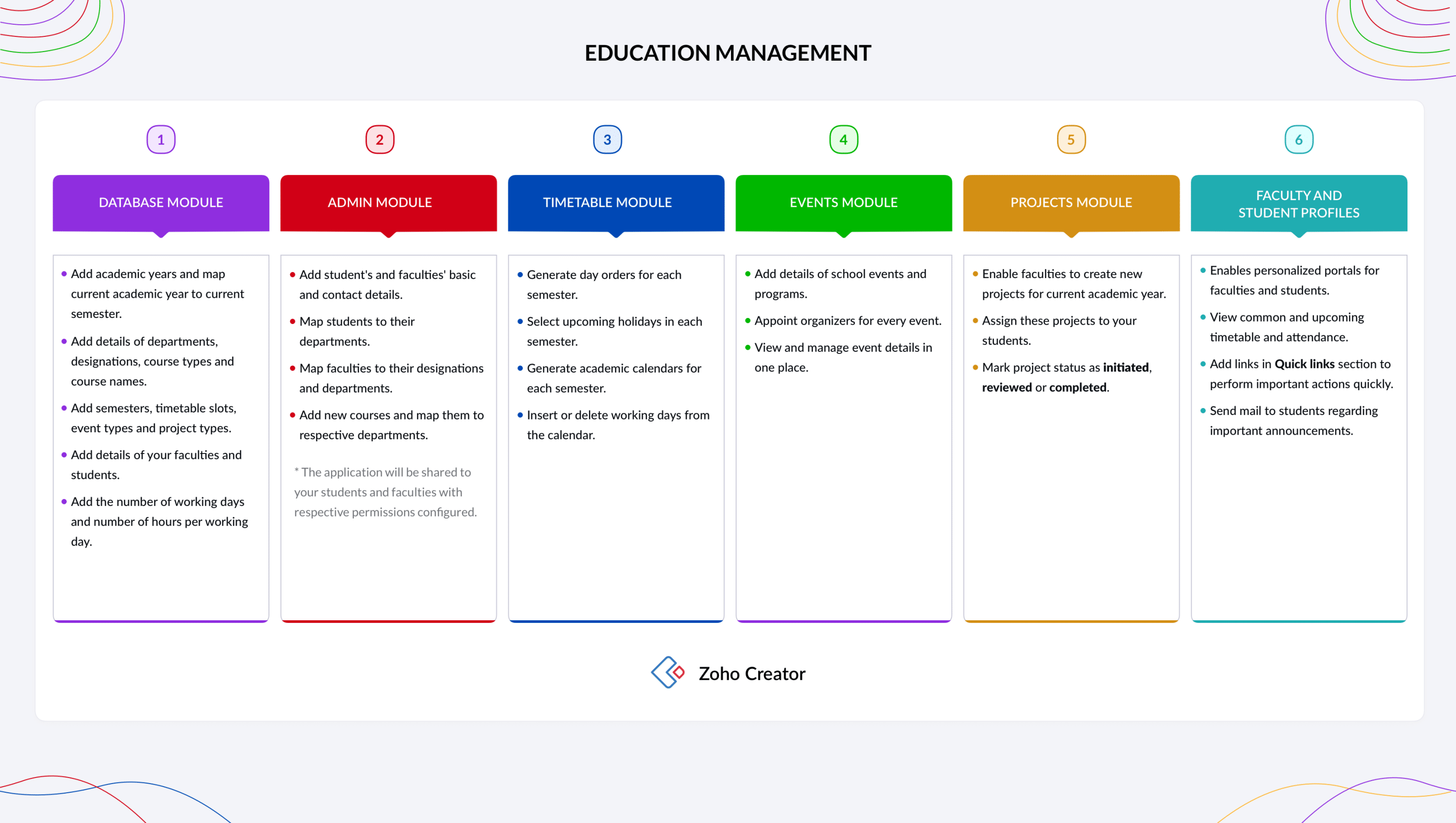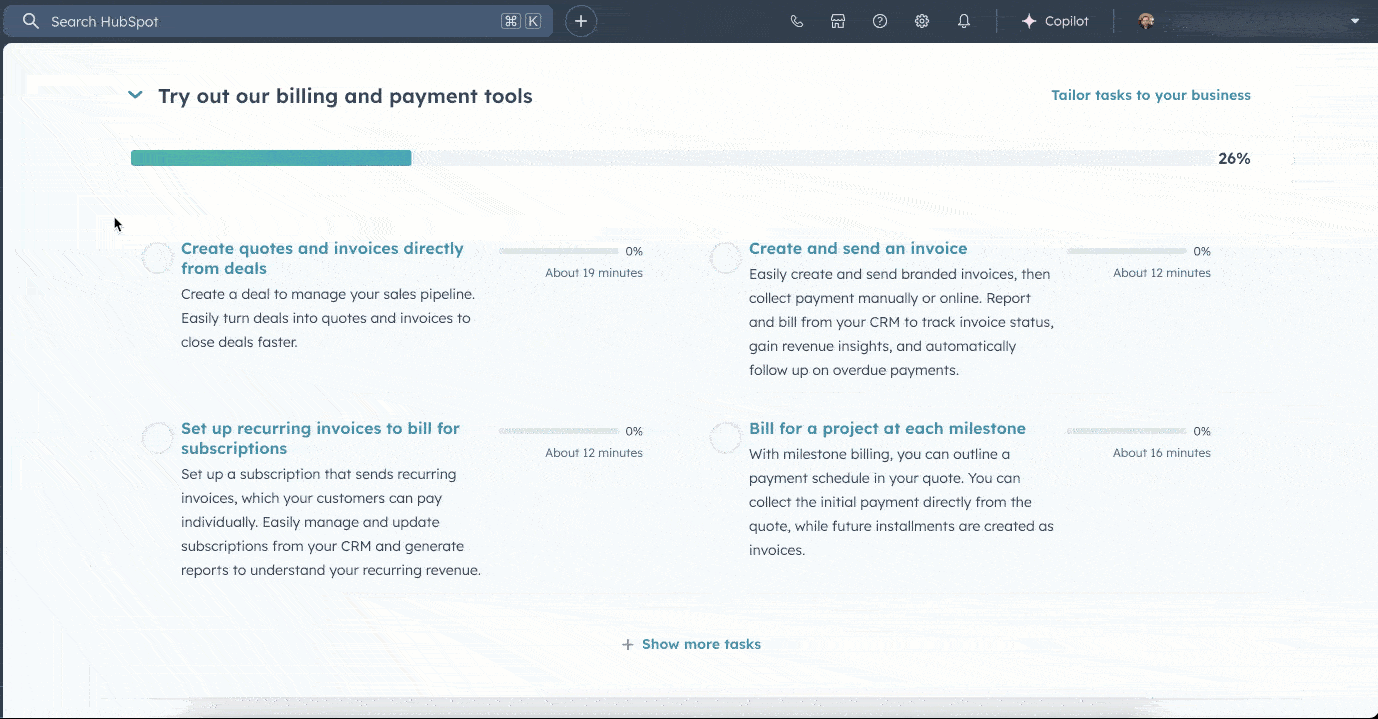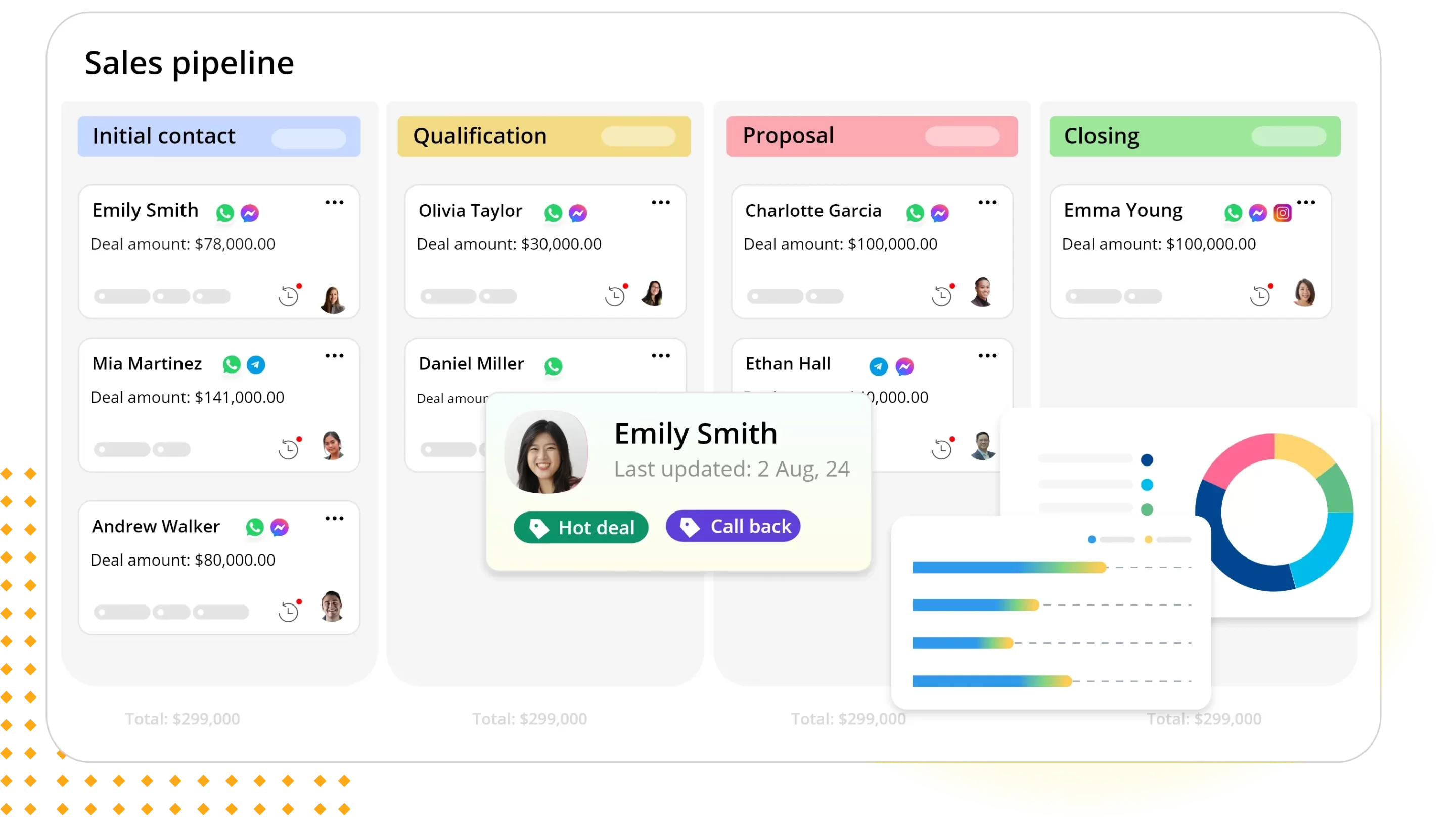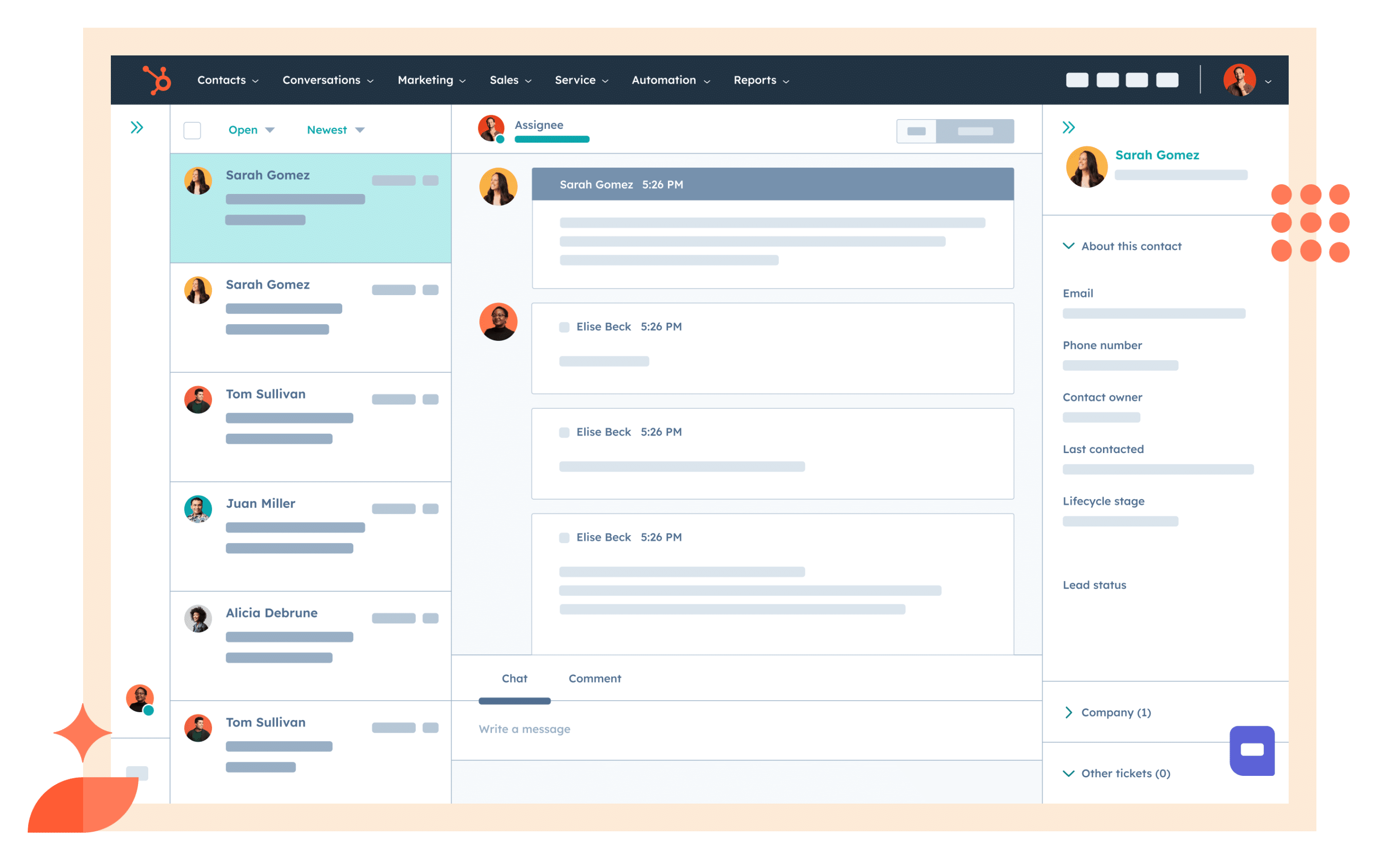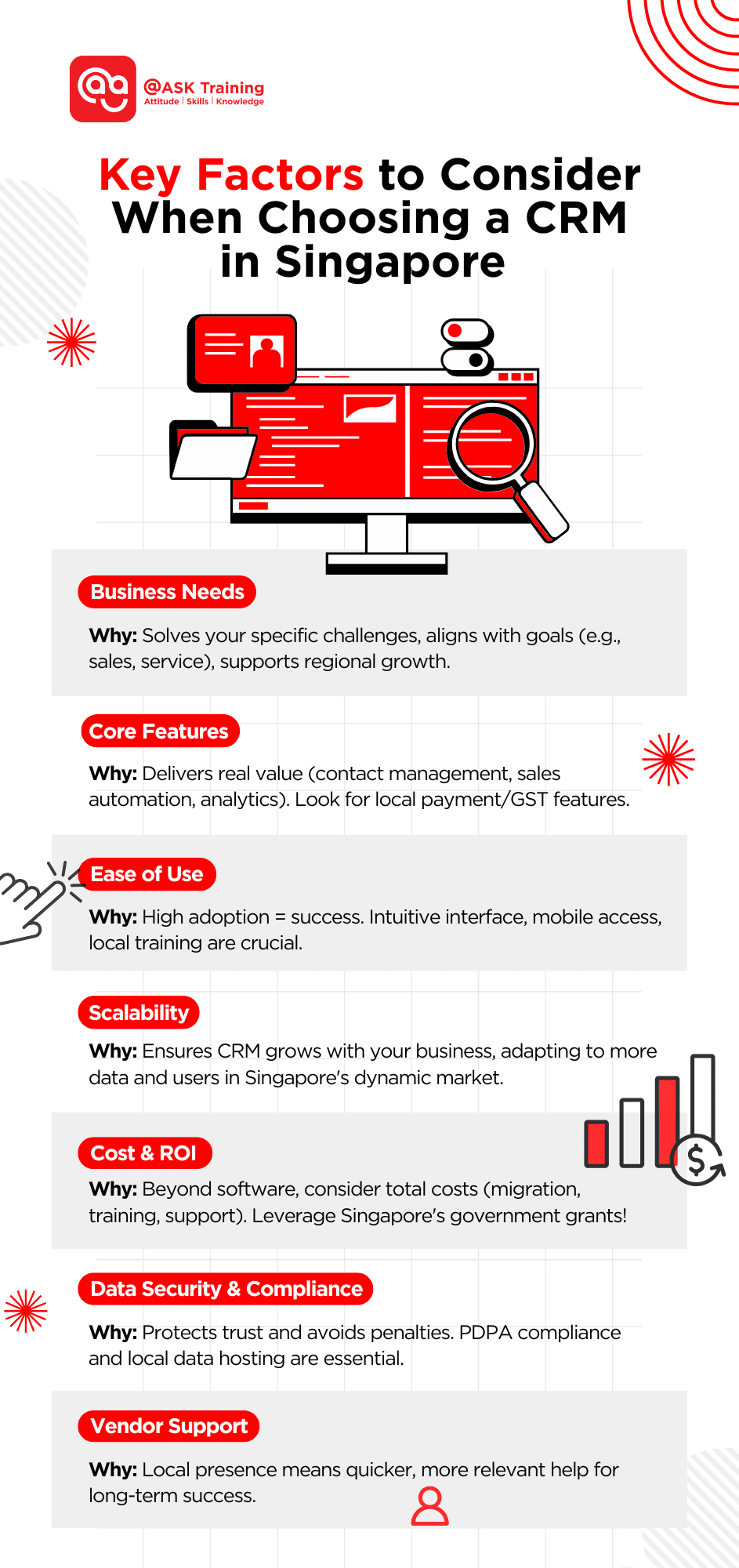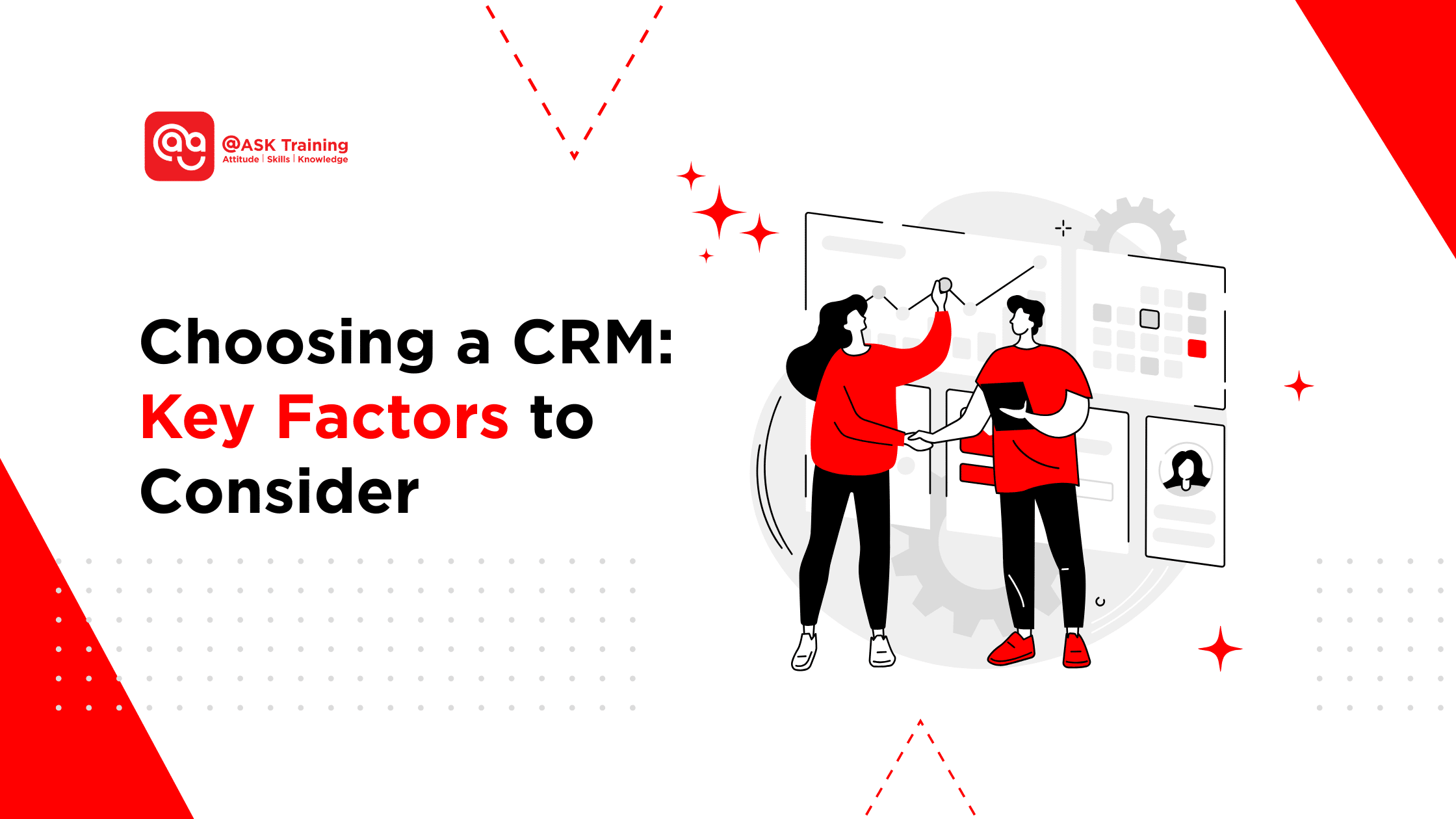
Let’s face it—managing customer relationships in Singapore’s fast-paced market isn’t easy. Between chasing leads, keeping clients happy, and staying ahead of competitors, how do you stay organised without drowning in spreadsheets?
That’s where a Customer Relationship Management (CRM) system comes in. Think of it as your business’s digital assistant—helping you track interactions, automate follow-ups, and turn data into actionable insights. But here’s the catch: not all CRMs are created equal.
Choosing the wrong one could mean wasted time, frustrated employees, and missed opportunities. On the other hand, the right CRM can boost sales, streamline operations, and even improve customer loyalty.
So, how do you pick the best CRM for your needs? Whether you’re a budget-conscious SME or a scaling enterprise, this guide will walk you through:
- Key factors to consider (hint: cost isn’t the only thing that matters).
- Industry-specific recommendations (because retail and healthcare have very different needs).
- Best practices to make to selecting a CRM that’s best for your business
By the end, you’ll have a clear roadmap to choose a CRM that fits your business today and grows with you tomorrow.
Ready to find your perfect match? Let’s dive in.
Understanding CRM and Its Role in Business
A CRM system helps businesses manage customer interactions, automate sales and marketing processes, and improve service delivery.
In Singapore, where customer expectations are high, a well-implemented CRM can:
- Boost efficiency by automating repetitive tasks (e.g., follow-ups, invoicing).
- Enhance customer satisfaction through personalised engagement.
- Provide data-driven insights to refine marketing and sales strategies.
For example, Singaporean businesses in retail, F&B, and financial services often use CRMs to track customer preferences and deliver tailored experiences.
Now, let’s explore how different business types in Singapore leverage CRM systems.
Business Types and CRM Needs in Singapore
Not all businesses operate the same way, and neither should their CRM systems. Whether you’re a fast-growing startup, an established enterprise, or a niche service provider, your CRM should align with your unique workflows, customer interactions, and industry demands.
Let’s break down the key CRM requirements for different business models in Singapore, helping you identify the right solution for your specific needs.
1. Small Businesses and Startups
Singapore’s SMEs and startups need affordable, scalable CRMs with local support.
Example: A local F&B startup like a café uses HubSpot’s free CRM to track customer orders, manage loyalty programs, and automate marketing emails—all without needing an IT team.
Why It Works:
- Cloud-based with mobile access for owners on the go
- Simple integration with tools like WhatsApp for customer chats
- Scales from 1 to 100+ users as the business grows
Many Singaporean startups use CRMs to automate lead tracking, critical in fast-moving industries like e-commerce and fintech.
2. Enterprises and Large Organisations
Large firms in Singapore (e.g., banks, logistics companies) require robust, secure CRMs.
Example: Singapore Airlines uses Salesforce to manage millions of customer interactions, personalise loyalty rewards, and sync data across departments (sales, customer service, and operations).
Why It Works:
- Handles massive data volumes and complex workflows
- AI-powered analytics to predict customer preferences
- Integrates with SAP for real-time financial reporting
Enterprises here often prioritise multi-language support (English, Mandarin, Malay) to cater to Singapore’s diverse customer base.
3. Service-Based Businesses (e.g., Healthcare, Consultancies)
Clinics, law firms, and consultancies benefit from CRMs with scheduling, client history tracking, and secure data storage.
Example: Local clinics in Singapore typically use clinic management systems (CMS) that are either local or regionally popular, such as Clinic Assist or Galen Health CMS. These systems digitise and optimise patient management, administrative tasks, billing, and compliance, enabling healthcare providers to focus more on delivering quality care.
Why It Works:
- HIPAA/PDPA-compliant data security
- Calendar sync for doctors and staff
- Billing and insurance claim integrations
4. E-commerce and Retail
With Singapore’s booming e-commerce sector, CRMs that integrate with Shopee, Lazada, or Shopify is invaluable. Features like real-time inventory tracking and AI-driven recommendations help retailers stay competitive.
During festive seasons (e.g., CNY, Hari Raya), CRMs with campaign automation tools are a game-changer for local retailers.
Example: Love, Bonito uses Zendesk as its core CRM platform to centralise and streamline customer communications across multiple channels.
Before Zendesk
- Customer support was scattered across channels, causing slow responses.
- Agents handled all requests manually, leading to delays.
- Limited insight into customer needs and preferences.
- Average customer satisfaction affected loyalty.
After Zendesk
- All customer messages are managed in one platform for faster support.
- AI Answer Bot resolves 35% of questions automatically.
- Automated workflows prioritise urgent issues to the right agents.
- Data helps personalise features like size recommendations.
- Customer satisfaction rose to 94%, with improved agent efficiency.
Why It Works
- Automation saves time and focuses agents on complex issues.
- A unified platform provides a full view of customers.
- AI enables quick self-service for customers.
- Data insights drive continuous experience improvements.
- A scalable system supports growth without losing quality.
5. Manufacturing and B2B Companies
B2B firms in Singapore often deal with long sales cycles, lead management, and supply chain coordination.
Example: HashMicro, a Singapore-based CRM software provider, has successfully partnered with local B2B companies for sales pipeline management, revenue forecasting, and integration with ERP systems.
Why It Works:
- Manages multi-stage B2B deals with approval workflows
- Integrates with IoT sensors for real-time logistics tracking
- Custom reports for procurement and supplier management
Now that we’ve covered business-specific needs, let’s dive into the key factors to evaluate when choosing a CRM in Singapore.
Key Factors to Consider When Choosing a CRM in Singapore
With dozens of CRM options available in Singapore, how do you identify the one that actually fits your business? These key factors in choosing a CRM will help you cut through the noise and select a system that delivers measurable results—not just another dashboard to monitor.
1. Business Needs and Objectives
Before comparing features, ask: What problems are we really trying to solve?
- Align the CRM with your goals (e.g., improving customer service vs. scaling sales).
- Why it matters: Your CRM should solve your specific challenges, not create new ones.
- If you’re expanding regionally (e.g., into Malaysia or Indonesia), ensure the CRM supports multi-currency and cross-border compliance.
Example: A local tuition centre needs a CRM to track student attendance, payment reminders, and parent communications. Zoho CRM offers education-specific modules for this.
Application Flow for Education Management (Source: Zoho)
Pro Tip: Map your customer journey first—a B2C retailer needs different tools than a B2B supplier
Once you’ve defined your needs, it’s time to examine the core features that fit those needs.
2. Core Features
Not all features are created equal—focus on what delivers real business value.
- Must-haves: Contact management, sales automation, reporting and analytics.
- Advanced options like AI-driven insights or mobile access can provide a competitive edge.
- Look for GST-friendly invoicing and integration with local payment gateways (e.g., PayNow, Stripe).
Example: HubSpot‘s built-in integration with Stripe enables Singapore-based businesses to process payments through locally preferred methods including credit/debit cards and PayNow.
Setting Up Billing and Payment Tools via HubSpot (Source: HubSpot)
But even the most powerful tools are useless if no one uses them.
3. Ease of Use and Adoption
A CRM is only as good as your team’s willingness to use it.
- Choose a CRM with a user-friendly interface and local training support.
- Singaporean businesses often prefer CRMs with mobile apps due to high smartphone usage.
Critical Factors to Look for:
- Intuitive interface design
- Mobile accessibility
- Training resources and onboarding support
- Customisable views for different roles
Example: Comparing Pepper Cloud CRM interface and HubSpot CRM interface.
Pepper Cloud Sales Pipeline Interface (Source: Pepper Cloud)
HubSpot’s Customer Journey Platform Interface (Source: HubSpot)
While your current needs are important, the real test comes when your business scales – will your CRM grow with you?
4. Scalability
Your CRM should accommodate both organic growth and strategic pivots.
Scalability Indicators:
- Flexible licensing models
- API availability for custom integrations
- Performance at increasing data volumes
- Modular add-on capabilities
Ensure the CRM can grow with your business—critical for Singapore’s fast-paced market.
Example Scenarios:
- Startup to Scaleup: Pipedrive scales from 5 to 500 users seamlessly
- Going Regional: Salesforce handles multi-country tax rules for expanding e-commerce brands
Of course, growth potential means little if the numbers don’t add up. Let’s move to the next factor.
5. Cost and ROI
Implementation costs often exceed software licensing fees.
- Compare pricing models (e.g., subscription vs. one-time fees).
- Many local CRMs offer government-supported subsidies (e.g., IMDA’s SMEs Go Digital programme).
Some of the cost components include:
- Data migration services
- Custom development
- Training programs
- Ongoing support fees
For example: The Productivity Solutions Grant subsidises 50-70% of approved CRM solution expenditures for qualifying SMEs, aligning with governmental digital transformation objectives to increase business productivity metrics.
While budgeting, never compromise on the next factor.
6. Data Security and Compliance
One data breach can destroy years of customer trust.
Verify PDPA compliance and encryption standards:
- PDPA Compliance: CRMs like Oracle offer built-in consent management
- Local Hosting: Microsoft Dynamics stores data in Singapore for faster access and compliance
Example: CRMs like Salesforce have data centres in Singapore, ensuring faster speeds and compliance.
7. Vendor Support
Opt for vendors with local offices (e.g., HubSpot’s APAC HQ in Singapore) for quicker support.
CRM Comparison Overview
Here’s an overview of popular CRM platforms suitable for companies in Singapore:
| CRM Platform | Pricing (SGD/user/month) | Best For | Key Features | PDPA Compliance | Local Support? |
| HubSpot CRM | Free to $20+ | Small to medium businesses | Contact management, sales automation, AI insights, marketing tools | Yes | Yes (regional offices) |
| Salesforce | From $35 (approx. $25 USD) | Growing to large enterprises | Advanced customisation, AI-powered analytics, workflow automation, multi-channel support | Yes | Yes (Singapore office) |
| Zoho CRM | From $19 | SMBs and growing teams | Workflow automation, AI assistant, analytics, multichannel communication | Yes | Yes (local partners) |
| EngageBay | From $20 | Small businesses, startups | Marketing automation, sales CRM, helpdesk, AI features | Yes | Limited (online support) |
| Freshsales (Freshworks CRM) | From $12 | SMBs and mid-market | AI-based lead scoring, workflow automation, omnichannel support | Yes | Yes (regional presence) |
| Pipedrive | From $26 | Sales-focused small teams | Visual sales pipeline, automation, AI sales assistant | Yes | Limited (online support) |
| Microsoft Dynamics 365 | From $90 | Large enterprises | Deep integration with Microsoft products, AI insights, advanced customisation | Yes | Yes (local partners) |
With these factors in mind, here are some best practices for CRM selection.
Do’s and Don’ts of CRM Selection
Even the most advanced system can fail if it’s not implemented strategically. First, let’s explore the common CRM mistakes businesses can make.
Top 3 Common CRM Mistakes Singaporean Businesses Make
We’ve seen it time and again: Singaporean companies stumble during CRM implementation due to a few recurring errors.
Here’s how to sidestep them:
- Underestimating Data Migration Complexity
- Many businesses think moving data is a simple copy-paste job.
- Tip to Avoid: Plan meticulously for data cleansing and migration.
- Dedicate sufficient time and resources to ensure your existing data is accurate, consistent, and properly mapped to the new CRM fields. Consider professional assistance if your data is extensive or complex.
- Neglecting Change Management
- Implementing a new CRM is a significant change, yet companies often overlook the human element.
- Tip to Avoid: Develop a robust change management strategy.
- Communicate the “why” behind the new CRM to your team, highlight its benefits, and address concerns proactively. Involve employees in the process to foster ownership and enthusiasm.
- Failing to Allocate a CRM Champion
- Without a dedicated internal advocate, CRM adoption can fizzle out.
- Tip to Avoid: Appoint a “CRM Champion” or internal expert.
- This individual will be responsible for driving adoption, providing ongoing support, gathering feedback, and ensuring the CRM continues to meet business needs. They’ll be your go-to person for all things CRM!
To guide your decision-making further, we’ve compiled essential dos and don’ts:
Dos:
- Do assess your needs thoroughly to avoid mismatched solutions.
- Do involve stakeholders in the decision-making process.
- Do test free trials and demos to gauge usability.
- Do prioritise scalability to accommodate future growth.
- Do evaluate vendor support to ensure long-term success.
Don’ts:
- Don’t choose based solely on cost—cheaper isn’t always better.
- Don’t ignore user reviews—feedback reveals real-world performance.
- Don’t overlook security—data breaches can be costly.
- Don’t skip customisation—a one-size-fits-all approach rarely works.
Your Mini-Roadmap for Successful CRM Onboarding & Adoption
Ready to ensure a smooth CRM journey? Follow this mini-roadmap:
Phase 1: Preparation & Planning (Weeks 1-4)
- Week 1-2: Define clear objectives, assess current processes, and select your CRM Champion.
- Week 3-4: Finalise CRM selection, sign contracts, and begin data cleansing.
Phase 2: Implementation & Customisation (Weeks 5-12)
- Week 5-8: Work with your vendor to configure the CRM, migrate clean data, and customise workflows.
- Week 9-12: Conduct initial user acceptance testing (UAT) with key stakeholders.
Phase 3: Training & Launch (Weeks 13-16)
- Week 13-14: Deliver comprehensive training sessions for all users. Focus on practical scenarios.
- Week 15: “Soft Launch” – begin using the CRM with a pilot group, gather feedback.
- Week 16: Official company-wide launch.
Phase 4: Optimisation & Ongoing Support (Ongoing)
- Monthly: Regular check-ins with your CRM Champion, gather user feedback, and identify areas for optimisation.
- Quarterly: Review CRM performance against your initial objectives and make adjustments as needed.
- Ongoing: Provide continuous training and support to new hires and existing users.
Following these guidelines will streamline your CRM selection process.
Final Thoughts
Selecting the perfect CRM isn’t about finding the most advanced or affordable system—it’s about aligning technology with your unique business needs and growth goals.
A recap on the key factors to consider when choosing a CRM in Singapore:
Here’s what matters most:
1. Start with Strategy
Define your objectives (e.g., sales automation, customer retention) before comparing features.
2. Prioritise Adoption & Scalability
A user-friendly CRM that grows with your business beats a “powerful” system nobody uses.
3. Balance Cost with Long-Term Value
Factor in hidden expenses (training, integrations) and leverage grants like Singapore’s PSG.
4. Industry Fit is Non-Negotiable
Retailers need omnichannel tools; service firms require scheduling—choose a CRM built for your vertical.
5. Data Security & Compliance
In regulated markets like Singapore, PDPA-ready systems (e.g., Salesforce, HubSpot) mitigate risk.
The best CRM for business simplifies complexity—it shouldn’t create more work. Test drive options with free trials, involve your team early, and measure success by tangible outcomes.
Ready to Transform Your Customer Relationships?
Implementing a CRM is just the beginning. To maximise its impact, equip your team with IT service management skills through @ASK Training’s IT Service Management & Help Desk Operations Course.
Learn how to:
- Streamline Incident Management Procedures
- Resolve technical issues efficiently
- Manage real-world IT service scenarios with hands-on practice
Explore and learn more today! Your perfect CRM is out there—now you know how to find it!
Related Courses
- IT Service Management and Help Desk Operations
- Operating Systems and Desktop Support Course
- IT Troubleshooting and Problem Solving
◆◆◆

